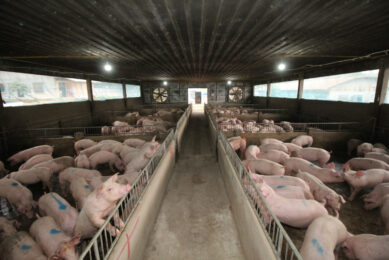Scientists map African Swine Fever virus genome

A team of researchers from the UK and Poland have mapped the expression of genes across the entire African Swine Fever virus (ASFv) genome. That has helped to establish their order of activation as well as uncovering new genes.
The researchers are connected to the University College London (UCL), the Pirbright Institute and the University of Warsaw, Poland, and had their research published in the peer-reviewed Journal of Virology.
Pride could be read in the abstract of the research article. They authors wrote: “Here we present the first much-needed genome-wide transcriptome study that provides unique insight into ASFv transcription and serves as a resource to aid future functional analyses of ASFv genes which are essential to combat this devastating disease.”
30 Novel genes uncovered
According to a news release at the website of UCL, the research could provide vital information for those developing vaccines and antiviral drugs to prevent the deadly pig disease caused by the virus. Lead professor Finn Werner, explained, “Our data shows ASFv has a complex and mammalian-like method for controlling gene expression, that uses specific promoters to enable RNA polymerase to differentiate between which genes it should express when during viral infection. Our study has also uncovered over 30 novel genes that were previously unknown.”
In their study, the researchers used next generation sequencing to analyse genes expressed by ASFv. From this they created a complete genetic road map, which reveals the order that different sets of ASFv genes are turned on throughout its infection cycle.
ASFv can shift the pattern of activated genes
Genes, including those in ASFv, are activated through a process called ‘transcription’, the news article at the UCL website went on to describe. That process is carried out by a molecular machine called RNA polymerase, which serves as ‘gatekeeper’ by ensuring that the information coded in the DNA is expressed at the correct time during infection. The RNA polymerase finds genes based on specific DNA sequences, or ‘promoters’, that are located before a gene.

Track the movement of African Swine Fever
For everything you need to know about ASF, from the latest outbreaks to controls stay up to-date…
The research team demonstrated that genes expressed during early infection have different promoters to those expressed later, allowing the virus to shift the pattern of activated genes according to the stage of infection. Genes used for DNA replication and immune system evasion are switched on early in the infection cycle, whereas those involved in creating proteins for the new virus particles are activated later.
ASFv has a very large DNA genome
Dr Linda Dixon is head of the ASFv Group at Pirbright and was co-author to the scientific article. In a news article on the Pirbright website, she commented, “ASFv has a very large DNA genome. For comparison, the influenza virus expresses 8 genes, whereas ASFv expresses between 150 and 190, which has so far made it difficult for scientists to identify and determine the significance of each gene. Our study helps to untangle which genes are important during different stages of infection to better understand their functions.”
According to the news article, by advancing knowledge of ASFv fundamental biology, the study provides vital information that will help to progress research into disease control methods.
The
research article in the Journal of Virology
was authored by Gwenny Cackett, Dorota Matelska, Michal Sýkora, Jürg Bähler and Finn Werner, University College London, United Kingdom; Raquel Portugal and Linda Dixon, Pirbright Institute, United Kingdom; and Michal Malecki, University of Warsaw, Poland.











